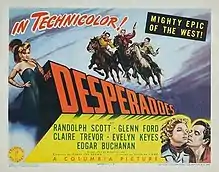The Desperadoes
The Desperadoes is a 1943 American Western film directed by Charles Vidor and starring Randolph Scott, Claire Trevor, Glenn Ford, Evelyn Keyes and Edgar Buchanan.[2] Based on a story by Max Brand, the film is about a wanted outlaw who arrives in town to rob a bank that has already been held up. His past and his friendship with the sheriff land them both in trouble. The Desperadoes was the first Columbia Pictures production to be released in Technicolor.[3]
| The Desperadoes | |
|---|---|
 Theatrical release poster | |
| Directed by | Charles Vidor |
| Produced by | Harry Joe Brown |
| Screenplay by | Robert Carson |
| Story by | Max Brand |
| Starring | Randolph Scott Claire Trevor Glenn Ford Evelyn Keyes Edgar Buchanan |
| Music by | John Leipold |
| Cinematography | George Meehan Allen M. Davey |
| Edited by | Gene Havlick |
| Color process | Technicolor |
Production company | Columbia Pictures |
| Distributed by | Columbia Pictures |
Release date |
|
Running time | 87 minutes |
| Country | United States |
| Language | English |
| Box office | $1.1 million (US rentals)[1] |
Plot
In 1863, a sheriff named Steve Upton (Randolph Scott) tries to keep the law in Red Valley, a small town in Utah. While he's away, the bank is robbed. The holdup was secretly masterminded by corrupt banker Stanley Clayton and the livery stable's boss, "Uncle Willie" McLeod, with the help of ruthless gunman Jack Lester, who shoots three innocent men.
Cheyenne Rogers rides to town. At the stable, Allison McLeod, daughter of Uncle Willie, recognizes the horse as one belonging to Steve. As the stranger goes to the saloon for a drink, Allison rides out to find Steve, whose mount was stolen on the trail.
"The Countess," who runs gambling at the saloon, is in love with Cheyenne, who was hired to help rob the bank but arrived too late. She blames herself for steering Cheyenne toward crime in the first place. Cheyenne finds a legitimate job, breaking broncos at a ranch.
Steve returns to town and is glad to see Cheyenne, an old friend. Lester turns the town against Cheyenne, revealing his outlaw past, and then his sidekick Nitro pulls off another robbery of the bank. A posse rounds up Cheyenne and Nitro and a judge sentences them to hang. But they are sprung from jail by Steve, who is then placed behind bars himself.
Alison goes to the Countess to beg for her help. She does, even though Cheyenne now loves Allison instead of her. Cheyenne slips a gun to Steve through a jailhouse window, and together they set about making things right. Uncle Willie, feeling guilt about his part in the robbery, ends up shooting Clayton in a gunfight. Allison is wed to Cheyenne while her father goes off to jail.
At one point while a heavily armed group of bad guys is waiting for Cheyenne to show up and rescue Steve one of the men remarks that when he does arrive, Cheyenne will think that he rode into "Custer's Last Stand." In reality, the Battle of the Little Big Horn does not take place for more that a dozen years after the film's 1863 setting.[4]
Cast
- Randolph Scott as Sheriff Steve Upton
- Claire Trevor as Countess Maletta
- Glenn Ford as Cheyenne Rogers
- Evelyn Keyes as Allison McLeod
- Edgar Buchanan as Uncle Willie McLeod
- Guinn 'Big Boy' Williams as Nitro Rankin
- Raymond Walburn as Judge Cameron
- Porter Hall as Banker Clanton[5]
- Bernard Nedell as Jack Lester (uncredited)
- Joan Woodbury as Sundown (uncredited)
- Irving Bacon as Dan Walters (uncredited)
- Glenn Strange as Lem (uncredited)
Production
The assistant director was Budd Boetticher, then using his real name, Oscar Boetticher, Jr. It was on this film that he met Scott and producer Brown. Fourteen years later, they would all reteam at Columbia to make the series of westerns known as the Ranown cycle (Ranown being a portmanteau of RANdolph and BrOWN).
Parts of the film were shot in Johnson Canyon, Kanab Canyon, the Gap, and Paria, Utah.[6]
References
- "Top Grossers of the Season", Variety, 5 January 1944 p 54
- "The Desperadoes". Internet Movie Database. Retrieved August 26, 2012.
- Toose, Gary W. "The Desperadoes". DVD Beaver. Retrieved August 26, 2012.
- 'The Dessperadoes", Columbia Pictures DVD Video, 2006
- "Full cast and crew for The Desperadoes". Internet Movie Database. Retrieved August 26, 2012.
- D'Arc, James V. (2010). When Hollywood came to town: A history of moviemaking in Utah (1st ed.). Layton, Utah: Gibbs Smith. ISBN 9781423605874.